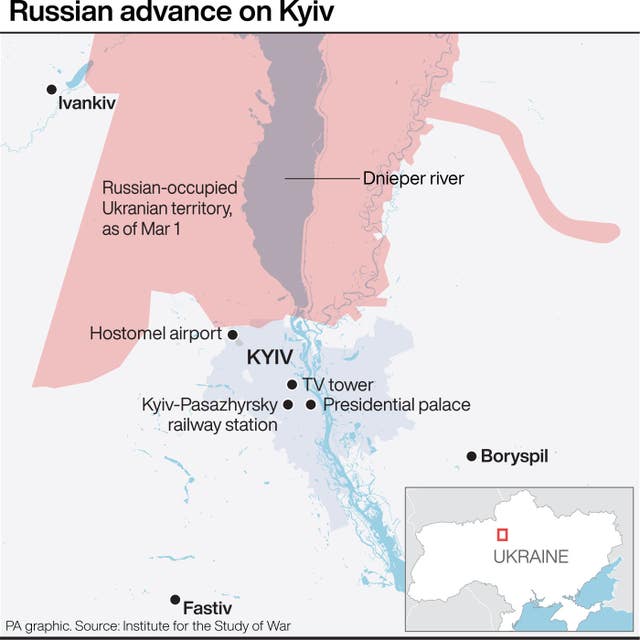Johnson’s ‘disgust’ at attacks on Ukraine amid fears Putin will ramp up violence
The Prime Minister offered support to Ukrainian President Volodymyr Zelensky in a call on Wednesday.

Boris Johnson condemned “abhorrent” attacks on Ukraine as the UK fears Vladimir Putin will use even more indiscriminate violence against the country’s capital Kyiv and other key cities.
The Prime Minister spoke to Ukraine’s President Volodymyr Zelensky to share his “disgust” at Russian attacks and promised to do “everything possible to support the Ukrainian people and their resistance”, Downing Street said.
Strikes that damaged the Babi Yar Holocaust memorial in Kyiv and the central square in Kharkiv have caused revulsion, and Western allies fear it is a sign of a shift in Russian tactics towards indiscriminate targeting of urban areas.
Defence Secretary Ben Wallace said Vladimir Putin knows “no limit” and will seek to “pummel” cities in tactics reminiscent of medieval siege warfare.
Russian troops have entered Ukraine’s second city Kharkiv following days of intensive bombardment, but Mr Wallace said Mr Putin’s forces did not yet control it.
The Ministry of Defence said the latest intelligence suggested Russian forces had reportedly moved into the centre of Kherson in south Ukraine.
Artillery and air strikes have targeted built-up areas in Kyiv, Kharkiv, Mariupol and Chernihiv.
But Mr Wallace said the advance of Russian forces continued to be slowed by a combination of overstretched logistics, poor morale and brave resistance by Ukrainian fighters.

He told BBC Breakfast that “none of the major cities have been taken control of”.
There was “huge amounts of low morale in the Russian forces, we’ve seen lots of surrenders”.
However, he added: “But that doesn’t take away from the fact you have a very ruthless Russian armed forces leadership and a president who seems to know no limit to how much violence they will use to achieve their aims.”
The lack of progress in meeting the aims of the invasion had led to a change in tactics, focusing on aerial and artillery bombardment of cities rather than the kind of lightning mobilised armoured advances originally envisaged by the Kremlin, Western military experts believe.
Mr Wallace told Sky News that meant a plan to “carpet-bomb cities, indiscriminately in some cases” and on BBC Radio 4’s Today he warned Russian forces would “pummel these cities with artillery and then hope to break the city”.
The tactics had been used in Chechnya but Ukraine is a different proposition because of its size and population.

Mr Wallace warned that an occupying force would face the kind of insurgency faced by the Soviets in Afghanistan or the UK and Western allies in Iraq.
“Invading a country with overwhelming force is one thing, occupying a people of 44 million who don’t want you in – it is a very different thing.”
There could be “years of resistance” to a Russian occupation, he said.
The Defence Secretary again rejected calls for the UK and its allies to enforce a no-fly zone in the skies above Ukraine, because shooting down a Russian plane could trigger a Europe-wide conflict between Mr Putin and Nato.

A no-fly zone would also have to apply to Ukrainian jets, meaning they could not target Russian forces from the air, he added.
“If you had a no-fly zone in Ukraine, the overwhelming scale of the Russian army would be able to drive around with impunity, which it can’t at the moment.”
But he said the UK had “led the way” in supplying surface-to-air weapons systems to Ukraine.
In other developments:
– Mr Johnson will face Prime Minister’s Questions after returning from a trip to show support to Nato allies Poland and Estonia.
– Foreign Secretary Liz Truss has announced further sanctions on Russian financial institutions.
– The UN General Assembly will vote on Wednesday on a resolution demanding that Russia immediately stops using force against Ukraine and withdraws its military from the country.
– The UK has also imposed sanctions on Belarus over its role in the invasion.
– US President Joe Biden used his State of the Union address to announce the closure of US airspace to Russian flights.
– Russia said it would be ready for further peace talks with Ukraine later on Wednesday.
A senior Western intelligence official estimated that more than 5,000 Russian soldiers had been captured or killed, while Ukraine has given no overall estimate of its military losses.
Mr Wallace said: “We have definitely seen cases of very quick surrenders by Russian forces, we have seen lots of abandonment of incredible pieces of equipment.”
The UN human rights office said on Tuesday it had recorded 136 civilian deaths including 13 children, but the real toll is believed to be far higher.
In the absence of direct military involvement, the response of the UK, US and European Union has been limited to providing support to Ukraine and imposing unprecedented sanctions on Russia.
In Washington, Mr Biden said: “Putin is now isolated from the world more than he has ever been.”
On Tuesday night the Foreign Office announced that sanctions were in force against Russia’s central bank and its sovereign wealth fund and its director.
Sberbank, Russia’s largest bank, which accounts for 35% of the financial sector, has also been prohibited from clearing sterling payments through the UK’s financial system.
Foreign Secretary Liz Truss said: “We said Putin and those around him would pay the price for their unprovoked and illegal invasion of Ukraine, and we are being true to our word.”
Earlier on Tuesday, Transport Secretary Grant Shapps had announced a ban on Russian-linked ships – and oligarchs’ private yachts – from British ports.





